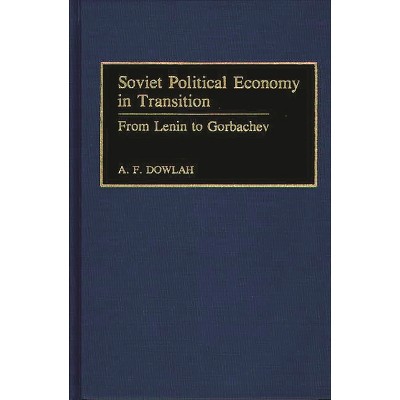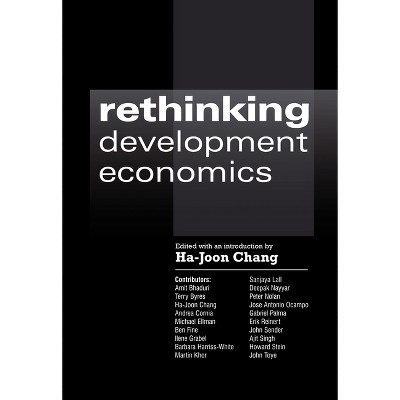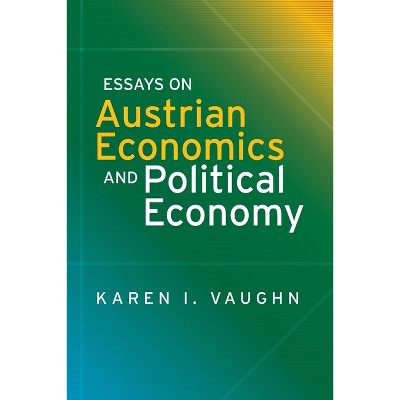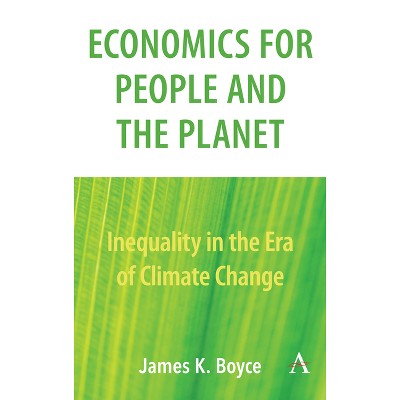Sponsored

Political Economy, Ideology, and the Impact of Economics on the Third World - by Derrick Gondwe (Hardcover)
In Stock
Sponsored
About this item
Highlights
- This work examines the practical impact of economics and economic ideology on the Third World.
- About the Author: DERRICK K. GONDWE is Professor of Economics at Gettysburg College in Pennsylvania.
- 208 Pages
- Business + Money Management, Development
Description
About the Book
This work examines the practical impact of economics and economic ideology on the Third World. Gondwe argues that the scientific and technical veil covering economics reduces its capacity to affect current and future economic problems. Further, by attempting to shed itself of its ideological underpinnings, economics--particularly neoclassical economics--is running the risk of becoming socially irrelevant. The author concludes that economics as it is now being practiced is inadequate to deal with real-world problems because its assumptions and methods bias it toward intellectual games and away from solutions to social problems. Economics, he argues, should return to the political economy it was before it was reduced to a mere study of markets, and the reintegration of economics into political economy should focus upon people, not wealth, as the subject and object of all economic activity.
This important work flies in the face of conventional economic wisdom and will be of interest to scholars in economics, political economy, political science, and economic history.
Book Synopsis
This work examines the practical impact of economics and economic ideology on the Third World. Gondwe argues that the scientific and technical veil covering economics reduces its capacity to affect current and future economic problems. Further, by attempting to shed itself of its ideological underpinnings, economics--particularly neoclassical economics--is running the risk of becoming socially irrelevant. The author concludes that economics as it is now being practiced is inadequate to deal with real-world problems because its assumptions and methods bias it toward intellectual games and away from solutions to social problems. Economics, he argues, should return to the political economy it was before it was reduced to a mere study of markets, and the reintegration of economics into political economy should focus upon people, not wealth, as the subject and object of all economic activity.
This important work flies in the face of conventional economic wisdom and will be of interest to scholars in economics, political economy, political science, and economic history.Review Quotes
?Gondwe advances a new perspective on political economy. In particular he attempts to reintegrate conventional (neoclassical) economic concepts into the broader field of political economy as originally defined by thinkers like Adam Smith, Ricardo, and Marx. The author believes that conventional economics deformed political economy by changing its focus from change to quantitative analysis. This role reversal, the author argues, was essentially ideological in nature. The arguments are then extended to include developing countries where ideological orientation of the neoclassical economics has had significant negative impacts on the development process. The volume begins with an introductory chapter outlining the book's contents. The second chapter focuses on the transition from political economy to conventional economics. Subsequent chapters explain various conservative, liberal, and radical ideologies in political economy; detail the theory of value, income distribution, poverty, unemployment, inflation, and economic growth from these perspectives; examine the impact of conventional development economics on the Third World; and detail the ideological orientations as applied to the Third World. Finally, the author advances a theory of "people-centered" political economy. A well-written introduction to the political economy of development and underdevelopment. Undergraduate; graduate.?-Choice
?Gondwe offers an excellent book suitable for readers with graduate training in economics or political science. He makes a substantive contribution by showing the influence of ideology in economic analysis and policy making.?-Studies In Comparative Int'l Dev.
?The presentation of the contributions of diverse authors to economic thought is refreshing. . . . In summary, although the book is rather ambitious, it throws light on the importance of the concept of political economy to analyze the development process more fully.?-Journal of Developing Areas
"Gondwe offers an excellent book suitable for readers with graduate training in economics or political science. He makes a substantive contribution by showing the influence of ideology in economic analysis and policy making."-Studies In Comparative Int'l Dev.
"The presentation of the contributions of diverse authors to economic thought is refreshing. . . . In summary, although the book is rather ambitious, it throws light on the importance of the concept of political economy to analyze the development process more fully."-Journal of Developing Areas
"Gondwe advances a new perspective on political economy. In particular he attempts to reintegrate conventional (neoclassical) economic concepts into the broader field of political economy as originally defined by thinkers like Adam Smith, Ricardo, and Marx. The author believes that conventional economics deformed political economy by changing its focus from change to quantitative analysis. This role reversal, the author argues, was essentially ideological in nature. The arguments are then extended to include developing countries where ideological orientation of the neoclassical economics has had significant negative impacts on the development process. The volume begins with an introductory chapter outlining the book's contents. The second chapter focuses on the transition from political economy to conventional economics. Subsequent chapters explain various conservative, liberal, and radical ideologies in political economy; detail the theory of value, income distribution, poverty, unemployment, inflation, and economic growth from these perspectives; examine the impact of conventional development economics on the Third World; and detail the ideological orientations as applied to the Third World. Finally, the author advances a theory of "people-centered" political economy. A well-written introduction to the political economy of development and underdevelopment. Undergraduate; graduate."-Choice
About the Author
DERRICK K. GONDWE is Professor of Economics at Gettysburg College in Pennsylvania. He holds a B.A. from Lake Forest College, an M.A. from the University of Wisconsin, and a Ph.D. from the University of Manitoba.Shipping details
Return details
Trending Non-Fiction











